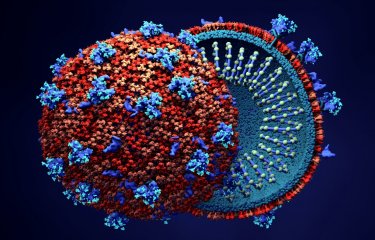A team at the Institut Pasteur has been investigating the possibility of reprogramming the immune cells of individuals living with HIV to halt the infection. The scientists recently revealed the potential of anti-cholesterol treatments to strengthen patients' immunity. This work has been published in eBioMedicine (The Lancet Discovery Science) (1).
Of every one thousand individuals living with HIV, a tiny fraction – fewer than five on average – are able to naturally control the virus. They are known as "HIV controllers". Their viral load is either very low or undetectable, even when no antiretroviral treatment is administered.
They owe this natural defense system to highly effective cytotoxic (CD8) T cells included in their arsenal of acquired immune cells.
CD8 T cells found in "controllers" have a specific molecular program enabling them to take targeted action whereby they "learn" to identify HIV-infected cells and effectively destroy them. In contrast, these cells are less effective and quickly become exhausted in most other individuals with HIV.
A link between statins and chronic inflammation in the body
It is actually possible to reprogram CD8 T cells in individuals with HIV to boost their capacity and resemble those found in controllers, something which has already been achieved in vitro by Institut Pasteur scientists. All that remained was to provide proof of concept in vivo and identify a molecule capable of modifying the T cells' molecular program.
So why were statins considered? This class of drugs is the standard treatment for hypercholesterolemia (an excess of LDL cholesterol, which is often referred to as "bad cholesterol") and cardiovascular risk prevention. However, in recent years, scientists have also taken an interest in their beneficial action in HIV infection.
In particular, their ability to reduce chronic inflammation linked to the development of various diseases in individuals with HIV has been demonstrated in previous research conducted by teams from the Paris Public Hospital Network (AP-HP) with the Institut Pasteur. Moreover, the scientists demonstrated that controllers' CD8 cells' capacity is highly determined by their metabolic program.
Statins modify CD8 T cells in some treated patients
The Viral Reservoirs and Immune Control Unit led by Asier Sáez-Cirión used this work as the basis for exploring the impact of statins on CD8 T cells' molecular program. Analyses were performed on samples from the study at three separate time points – prior to rosuvastatin treatment, after three months of treatment and three months after statins had been discontinued – for ten participants who were simultaneously administered an antiretroviral treatment.
Asier Sáez-Cirión summarizes the results as follows: "In all the participants, the CD8 T cells' program was modified significantly and in relation to several parameters including enhanced survival and proliferation, enhanced functionality and a reduced tendency for exhaustion. They therefore exhibit characteristics more akin to those of natural HIV controllers. However, this action ceases as soon as treatment is discontinued."
A springboard for new therapeutic strategies
This work proves that it is possible to modify CD8 T cell characteristics through in vivo treatment with well-known, well-tolerated molecules that have low toxicity, thus paving the way for new therapeutic strategies.
"It won't be possible to cure people of HIV or achieve remission with statins. However, we now have a valuable starting point from which to envisage new treatments. We believe we can considerably enhance the capacity of CD8 T cells by supplementing immunotherapies with statins."
The ultimate goal is to enable everyone with HIV to one day become controllers and discontinue their treatment in the long term without experiencing viral rebound. However, a number of steps still need to be taken before achieving this. For the time being, "we are seeking to gain a more precise understanding of the cellular reprogramming mechanism," explains Asier Sáez-Cirión.
The results of the study also need to be confirmed based on a broader sample with a control group. A controlled preclinical study is currently being conducted with the University of Pittsburgh to assess the impact of various diets with or without statins. Preliminary results are expected in 2026.
(1) Impact of rosuvastatin on the memory potential and functionality of CD8+ T cells from people with HIV, published in eBioMedicine, April 2025.





